
Saudi Vision 2030, endorsed by the Custodian of the Two Holy Mosques, King Salman bin Abdulaziz Al Saud, on April 25, 2016, and spearheaded by Crown Prince Mohammad bin Salman, aligns seamlessly with the dynamic trends shaping our world today.
It is important to recognize the significance of the Sustainable Development Goals (SDGs) 2030 when discussing this Vision. These global objectives, embraced by most countries worldwide, demonstrate a collective dedication to improving the planet’s sustainability and promoting human well-being through individual, institutional, and international efforts for sustainable global growth.
As a researcher specializing in social responsibility and sustainable development, I perceive the SDGs as a fundamental cornerstone that supports the foundation of Saudi Vision 2030. The Vision’s implementation involves transforming institutional operations into goal-driven initiatives, with transparent evaluation through performance indicators.
Although a comprehensive exploration of the alignment between Saudi Vision 2030 and the SDGs exceeds the scope of this article, it is important to note that Saudi Vision aims to achieve all 17 SDGs, aligns with them, and has already made significant progress in many areas.
In this article, I intend to spotlight a specific goal, SDG 5, which strives for gender equality, and the pivotal role that Saudi Vision 2030 plays in advancing this objective.
From its inception, the laws of the Kingdom of Saudi Arabia have been devoid of gender-based discrimination, as they are ingrained in Islamic principles. Saudi Vision 2030 extends this approach, in harmony with the SDGs.
Despite unfounded accusations and misleading narratives, Saudi Arabia’s commitment to gender equality is evident. Claims calling for women’s liberation often stem from ulterior political motives, detached from an accurate assessment of reality. Both Saudi society and the global community recognize the baselessness of such allegations.
Since the inception of Saudi Vision 2030 and its alignment with SDG 5 on gender equality, remarkable progress has rapidly transpired within Saudi Arabia. This transformation is not a response to unfounded claims but rather stems from the vital role that women’s participation plays across diverse developmental domains. The architects of Saudi Vision 2030 have strategically set objectives to bolster women’s engagement across sectors, propelling the nation towards its developmental aspirations.
Saudi women are active in public roles, occupying prominent positions across the Parliament and Shura Council, as well as making impactful contributions within the political, administrative, economic, and social spheres. This multifaceted engagement respects their individual choices and privacy. An impartial assessment reveals that, in pursuit of this specific goal, Saudi Arabia might indeed outpace many developed nations invested in gender equality.
As a dedicated researcher, I firmly believe that, with divine grace, this goal of gender equality will likely materialize well before 2030. The contemporary landscape already reflects a tangible rise in women’s participation across various sectors. Saudi Vision 2030 remains steadfast in its commitment to nurture and
empower the human capital necessary to translate the Vision’s objectives into tangible projects that foster social advancement and economic prosperity throughout the Kingdom of Saudi Arabia.